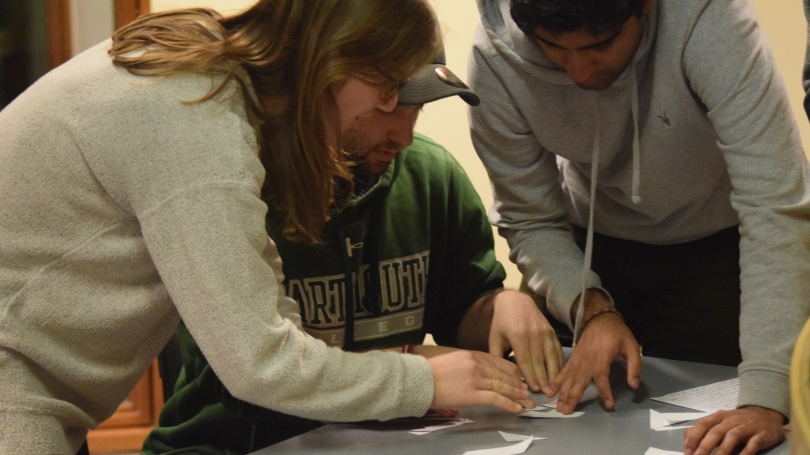
- Public Policy
- Leadership
- Funding
- News & Events
- About the Center
Back to Top Nav
Back to Top Nav
Back to Top Nav
Back to Top Nav
Alison Fragale graduated from Dartmouth in 1997, majoring in math and economics. After graduation, she worked as a management consultant for McKinsey before leaving to pursue her Ph.D. in Organizational Behavior, with a focus in social psychology, at Stanford. Currently, Alison works as the associate professor of organizational behavior and strategy at the University of North Carolina’s business school. Additionally, she does research on interpersonal hierarchies in groups and organizations.
On the last Thursday of January, the Rockefeller Leadership Fellows had the privilege of listening to Alison speak about delegation, including when we should delegate, how to delegate, and who to delegate to. The session began with an exciting team-based game, involving a management and production group for each team. The game demonstrated how open communication and sharing of knowledge and tasks resulted in faster performance. We then shifted to defining delegation as a shift in decision making authority. Often, we hinder ourselves from delegating with thoughts like “it’s quicker if I do it myself” or “only I can do it right.” However, delegation is beneficial to allow yourself, as a leader, to focus on tasks that you do better than anyone else that are also critical for your organization. In order to delegate, we must paint the picture of the effort to performance to outcome chain, clearly defining the task, picking the person with the necessary skills, providing resources and coaching, and explaining the value of the assignment.
As the copious notes in my reflection notebook show, this session had a great impact on me. As leaders, it is a common misconception that we have to shoulder all the responsibility of our organizations, and it was a good reminder that it is okay to share tasks and even advantageous to do so. Another important point was the importance of understanding the people you are working with. As a leader, we must understand what the individuals on our team value in order to delegate. Everyone values doing meaningful work, doing work with a variety, doing work that they can own, among other values, with varying importance. By listening to and understanding the people you work with, you can delegate work based on what skills people have and what outcomes they value. Overall, Alison’s session embodied what it means to be a leader, to be able to delegate through being willing to share and shift our power and responsibilities and knowing how to delegate based on our understanding of our team.
-Written by Catherine Zhao, Class of 2020 Rockefeller Leadership Fellow
As Rockefeller Leadership Fellows, seniors gain a better understanding of the qualities and responsibilities expected of leaders. As Fellows take part in the workshops, dinner discussions, and team-building exercises, they examine their skills, qualities, and attributes as leaders and analyze how these influence teamwork and achieving goals.